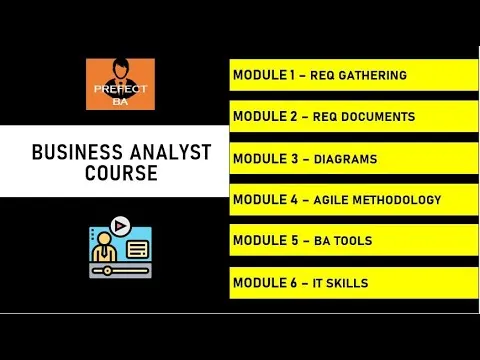
Problem Solving with Advanced Analytics 
This course provides an introduction to problem solving with advanced analytics. It covers the fundamentals of applying a useful framework to solve a business problem, determining which analytical method to apply given the nature of the problem and available data, and using linear regression to generate business insights. Participants will gain the skills to identify and analyze data, develop models, and interpret results to make informed decisions. The course will also cover the use of other advanced analytics techniques such as machine learning, artificial intelligence, and natural language processing. ▼
ADVERTISEMENT
Course Feature
![]() Cost:
Cost:
Free
![]() Provider:
Provider:
Udacity
![]() Certificate:
Certificate:
No Information
![]() Language:
Language:
English
![]() Start Date:
Start Date:
Self Paced
Course Overview
❗The content presented here is sourced directly from Udacity platform. For comprehensive course details, including enrollment information, simply click on the 'Go to class' link on our website.
Updated in [May 17th, 2023]
This course, Problem Solving with Advanced Analytics, provides students with the skills to apply a useful framework to solve a business problem. Students will learn how to determine which analytical method to apply given the nature of the problem and available data. Additionally, students will gain the ability to use linear regression to generate business insights.
[Applications]
The application of this course can be seen in many areas. It can be used to identify trends in customer behavior, predict future sales, and optimize marketing campaigns. It can also be used to identify areas of improvement in operational processes, such as inventory management and supply chain optimization. Additionally, it can be used to develop predictive models for forecasting and risk management. Finally, it can be used to develop predictive models for customer segmentation and targeting.
[Career Paths]
1. Business Analyst: Business Analysts are responsible for analyzing data and developing insights to help organizations make better decisions. They use a variety of analytical techniques, such as linear regression, to identify trends and patterns in data. As businesses become increasingly data-driven, the demand for Business Analysts is expected to grow.
2. Data Scientist: Data Scientists use advanced analytics to uncover insights from large datasets. They use a variety of techniques, such as machine learning and natural language processing, to analyze data and develop predictive models. As businesses become more reliant on data-driven decision making, the demand for Data Scientists is expected to increase.
3. Data Engineer: Data Engineers are responsible for designing, building, and maintaining data pipelines. They use a variety of technologies, such as Apache Spark and Hadoop, to process and store large datasets. As businesses become more reliant on data-driven decision making, the demand for Data Engineers is expected to increase.
4. Machine Learning Engineer: Machine Learning Engineers are responsible for developing and deploying machine learning models. They use a variety of techniques, such as deep learning and reinforcement learning, to develop models that can make predictions and generate insights. As businesses become more reliant on data-driven decision making, the demand for Machine Learning Engineers is expected to increase.
[Education Paths]
1. Data Science Degree: Data Science is a rapidly growing field that combines mathematics, statistics, computer science, and business knowledge to analyze and interpret large datasets. This degree path focuses on developing the skills necessary to analyze data, build predictive models, and create visualizations to communicate insights. As data becomes increasingly important in the business world, the demand for data scientists is expected to continue to grow.
2. Business Analytics Degree: Business Analytics is a field that focuses on using data to make better business decisions. This degree path focuses on developing the skills necessary to analyze data, build predictive models, and create visualizations to communicate insights. It also covers topics such as data mining, machine learning, and optimization. As businesses become increasingly data-driven, the demand for business analytics professionals is expected to continue to grow.
3. Artificial Intelligence Degree: Artificial Intelligence (AI) is a rapidly growing field that focuses on developing computer systems that can think and act like humans. This degree path focuses on developing the skills necessary to design and implement AI systems, as well as understanding the ethical implications of AI. As AI becomes increasingly important in the business world, the demand for AI professionals is expected to continue to grow.
4. Machine Learning Degree: Machine Learning is a field that focuses on developing algorithms that can learn from data and make predictions. This degree path focuses on developing the skills necessary to design and implement machine learning algorithms, as well as understanding the ethical implications of machine learning. As machine learning becomes increasingly important in the business world, the demand for machine learning professionals is expected to continue to grow.
Course Provider

Provider Udacity's Stats at AZClass
Discussion and Reviews
0.0 (Based on 0 reviews)
Explore Similar Online Courses

1 Hour Ashtanga Yoga (intro class)

Python Developer Bootcamp in 2022 - Beginner to Expert

Python for Informatics: Exploring Information

Social Network Analysis

Introduction to Systematic Review and Meta-Analysis

The Analytics Edge

DCO042 - Python For Informatics

Causal Diagrams: Draw Your Assumptions Before Your Conclusions

Whole genome sequencing of bacterial genomes - tools and applications

Business Analyst Full Course In 2 Hours Business Analyst Training For Beginners Simplilearn

Business Analyst Training for Beginners Business Analysis Tutorial Invensis Learning


Start your review of Problem Solving with Advanced Analytics